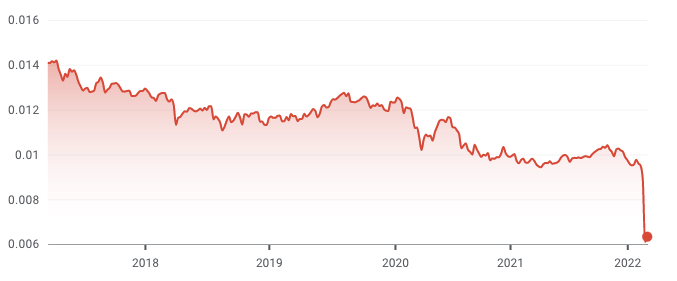In 1984 the British half pence piece was abolished. Thanks to inflation, there was almost nothing to purchase at that price, so the fiddly coins were rendered obsolete. However, in 2022, it might not be long before a ha’penny does buy you something of note — namely, one Russian ruble. As of last night, the exchange rate stood at one ruble to 0.006 British pounds. At the end of last year, a ruble was still worth a whole penny, so that’s a 40% fall in value, most of which has taken place since the invasion of Ukraine.
This collapse, while extreme, is not unprecedented. The ruble also plummeted in 2014 after Russia’s annexation of Crimea and incursions into eastern Ukraine. The Putin government survived that shock to the system because the oil and gas exports that sustain the Russian economy are paid for in western currencies, mostly US dollars and euros.
The oligarchy that keeps Putin in power controls the oil and gas industry; so, unlike ordinary Russians, they are insulated from the long-term decline in the national currency. Indeed, flush with sought-after dollars, the domination of the elite over the rest of the Russian economy has only been enhanced.
Will the same be true of the latest devaluation? There are signs that this time is different. For instance, the Russian government has suspended purchases of foreign currency by its own citizens. Russians won’t be allowed to exchange rubles for dollars for the next six months at least.
Being well aware of the weakness of the ruble, millions of Russians have accumulated savings in dollars and other foreign currencies. However, unlike the oligarchs, who have the means to move their wealth offshore to London and other global financial centres, ordinary Russians rely on bank accounts under the ultimate control of the Kremlin.
This week, a $10,000 limit on how how much foreign currency citizens can withdraw was imposed. This will force Russians to use more rubles, which can be printed at will by the state. The withdrawal cap also means a cash-strapped government has the option of raiding what remains in bank accounts. All that would be required is a special tax or the compulsory conversion of hard currency savings into rubles.
The Russian government is already using similar tactics against a list of “hostile” countries. Public and private sector borrowers have been authorised by the Kremlin to repay their debts to western lenders in rubles (as opposed to the currency in which the money was borrowed). With the ruble rapidly losing its value this amounts to a programme of mass default.
This is more reason for the West to stop lending and selling to Russia; but with sanctions cutting off the flow of finance and goods anyway, it could be that Putin thinks there’s nothing to lose. Furthermore, he’s always got China to trade with. Therefore the most important exchange rate may prove to be the value of the ruble against the yuan. And this week it’s hitting a record low.











Join the discussion
Join like minded readers that support our journalism by becoming a paid subscriber
To join the discussion in the comments, become a paid subscriber.
Join like minded readers that support our journalism, read unlimited articles and enjoy other subscriber-only benefits.
Subscribe